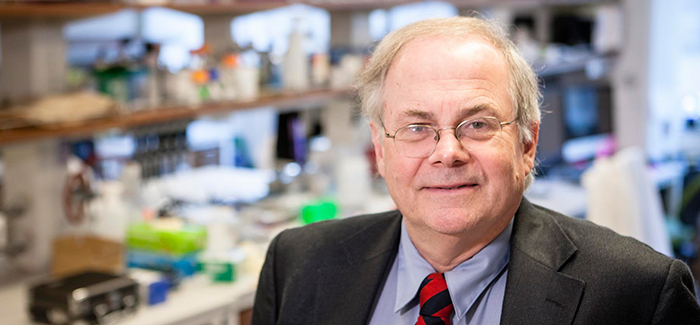Stopping a disease that is slow but relentless
By Jan Jarvis

Photo credit: Carlos Rene Perez/Weill Cornell Medicine
Parkinson’s disease is slow but relentless, and progresses over some 20 years.
It takes the body, but leaves the mind intact until the late stages, said Dr. Gregory Petsko, a renowned scientist who will speak at the Neurobiology of Aging Trainee Symposium, hosted by UNT Health Science Center’s Institute for Healthy Aging.
“People know what is happening until the end,” he said. “Treatments are purely symptomatic, but the disease goes on.”
For decades, Dr. Petsko has focused on understanding neurologic diseases such as Parkinson’s at the molecular level. A member of the National Academy of Sciences, Dr. Petsko was named one of the 30 most influential people in the world in public health in 2014. He has an endowed professorship at Weill Cornell Medical College, is an adjunct professor at Cornell University and professor emeritus at Brandeis University.
|
Neurobiology of Aging Trainee Symposium Dr. Gregory Petsko:
|
He will share his insights during his presentation, “How Parkinson’s Disease Starts – And How It Might Be Stopped,” at 11:45 a.m. Thursday in the Center for BioHealth (CBH 230). His talk is open to the public and is the highlight of the National Institutes of Health-funded symposium, which also will feature 10 presentations from UNTHSC students and postdocs on aging-related topics such as stroke, cognitive function and movement disorders.
About 1.3 million people have Parkinson’s disease, a figure is expected to triple over the next 35 years. Dr. Petsko said he and others have been looking for ways to prevent the disease or at least freeze it in its tracks.
Possible risk factors include head injuries, high cholesterol, brain infections, inflammation and the bird flu.
“People with melanoma are much more likely get Parkinson’s and the reverse is true,” he said. “But nobody understands the basis for this.”
A popular speaker on TED Talks, Dr. Petsko has garnered more than 800,000 views online. His presentation is expected to attract a wide audience interested in neurologic diseases and their impact on public health, said Michael Salvatore, PhD, Associate Professor in the Center for Neuroscience Discovery and one of the symposium organizers.
“Dr. Petsko stands at the forefront as a biomedical scientist who fully understands and communicates about the gravity of the health consequences of aging-related impairments to our well-being and health, in not only our nation but also the world,” Dr. Salvatore said.






Social media